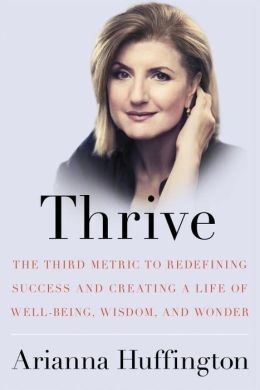More on this book
Community
Kindle Notes & Highlights
Thrive: The Third Metric to Redefining Success and Creating a Life of Well-Being, Wisdom, and Wonder
Read between
February 1 - April 4, 2023
Most remained unfinished, and many were not even started. Yet these countless incomplete projects drained my energy and diffused my attention.
“Angels fly because they take themselves lightly,”
If you walk in with fear and anger, you’ll find fear and anger. Go into situations with what you want to find there.…
slaying our old habits—our own Minotaurs—it is critical to find the thread that works for us. When we do, no matter what life throws our way we can use the thread to help us navigate the labyrinth of daily life and come back to our center.
Some of these habits are useful and some are not. Some start out being useful and become destructive later on or in different contexts. But the internal machinery we’ve developed to create them doesn’t discriminate. And whether good or bad, once established, habits rapidly grow roots and entrench themselves in our lives. And that’s the problem—habits are a lot easier to learn than to unlearn, easier to bury than to exhume.
anger, envy, sorrow, regret, greed, arrogance, self-pity, guilt, resentment, inferiority, lies, false pride, superiority, and ego.” He continued, “The other is good—he is joy, peace, love, hope, serenity, humility, kindness, benevolence, empathy, generosity, truth, compassion, and faith. The same fight is going on inside you—and inside every other person, too.”
But we don’t have to wait until we move or change jobs to change our lives. Nor do we have to wait for large-scale, upstream change. We can initiate change right now. There are endless starting points.
“The Stoic creed didn’t promise material security or a peace in the afterlife; but it did promise an unshakable happiness in this life.”
who nevertheless had a deep understanding that happiness and peace do not lie in the outside world.
We have little power to choose what happens, but we have complete power over how we respond. It all starts with setting the expectations that make it clear that no matter how much hardship we encounter—how much pain and loss, dishonesty, ingratitude, unfairness, and jealousy—we can still choose peace and imperturbability.
Sometimes people let the same problem make them miserable for years when they could just say “so what.” That’s one of my favorite things to say.
“As I walked out the door toward the gate that would lead to my freedom, I knew if I didn’t leave my bitterness and hatred behind, I’d still be in prison.”
“three C attitudes.” First, there was commitment: deciding to join in and try to be a part of the solution. Next was control: fighting to maintain a sense of resolve as opposed to resignation. And last was challenge: finding ways to use the crisis to strengthen themselves, to build resilience and grow.
There is a big difference between stoic acceptance and resignation.
1. Listening to your inner wisdom, let go of something today that you no longer need—something that is draining your energy without benefiting you or anyone you love. It could be resentments, negative self-talk, or a project you know you are not really going to complete. 2. Start a gratitude list that you share with two or more friends who send theirs to you. 3. Have a specific time at night when you regularly turn off your devices—and gently escort them out of your bedroom. Disconnecting from the digital world will help you reconnect to your wisdom, intuition, and creativity. And when you
...more
Wonder is not just a product of what we see—of how beautiful or mysterious or singular or incomprehensible something may be. It’s just as much a product of our state of mind, our being, the perspective from which we are looking at the world.
Museums and galleries remain among the few oases that can deliver what has become increasingly rare in our world: the opportunity to disconnect from our hyperconnected lives and experience the feeling of wonder.
Fully giving our attention to anything—or anyone—is precisely what is becoming more and more rare in our hyperconnected world, where there are so many stimuli competing for our time and attention and where multitasking is king.
When we disconnect from our inner selves and identify exclusively with our ego, that’s when we lose our connection with life’s meaning and purpose and are left facing a void that we try to fill with more money, more sex, more power, more fame.
Holidays were traditionally intended as a time to recharge ourselves spiritually as well as physically—to make ourselves slow down, tap into our inborn but suppressed ability to wonder, and to make us recognize the breadth and the bounty in our lives.
we need to take the time to wonder at the world around us, feel gratitude for the good in our lives, and overcome our natural bias toward focusing on the negative. And in order for it to “take,” to become part of us, we need to slow down and let wonder do its job, at its own pace.


